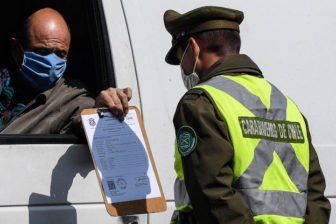Chileans went to the polls on Nov. 21 for a monumental election, voting not only for the next president but also determining the makeup of Congress, alongside several down-ballot local elections. Results showed voters turning their backs on traditional parties, as the far-right former legislator José Antonio Kast edged leftist Congressman Gabriel Boric for first place. As of publication, Kast had earned 27.9% of the vote to Boric’s 25.8%. Both fell short of the majority needed to win outright, and will face each other in a runoff on Dec. 19.
Boric and Kast began election day as favorites, with voters deeply divided after years of civil unrest and protests against Chile’s economic model. A convention to replace the dictatorship-era constitution is set for next year. But the election was not without surprises. Franco Parisi, an anti-immigration, pro-business political outsider, performed better than expected with 12.8% of the vote, ahead of two traditional coalitions that had governed Chile for the last 30 years.
The result sets up a contest to see which end of the political spectrum can win over more moderate voters. AQ asked observers to share their reaction to the result, and their thoughts on what lies ahead.
Kenneth Bunker, political scientist and executive director at Tresquintos:
Whatever the polls said, most people still thought Boric would win the first round just because he’s in greater synchronicity with the political context of Chile, or at least that is what the thought was. After you have 80% of people voting to replace the constitution and you have the massive win for independents and the left in the constitutional convention, it just seemed natural for Boric to win with a higher percentage of votes – at least over one third – in the first round. But that was not the case. This seems to be a paradox of how it can be possible for the left and for independents to win two elections and not win this third one with Boric, a young leftist student leader from a new generation.
I think actually this can be explained if you position the candidates on the cleavage of order and change, with Boric representing change and Kast representing order. Both are the champions of each of these concepts. I think what experts thought is that people would be more willing to vote for change, because that’s what happened with the plebiscite and the constitutional convention. But of course this was not the case. What actually happened is that people do want change. They are progressive. They are liberal. They are aligned with what’s happening with the constitutional process. But they also want this with order. They want change, but not at any cost.
Between the constitution plebiscite and today, there’s been violence on the street. There’s been chaos in the economy. There’s been inflation. If you also add what’s happening with the pandemic and with migration in the north, it just seems very clear that people were sliding from change towards order, which is what was being championed by Kast.
Paula Schmidt, journalist and columnist at El Líbero, and professor at Chile’s University of the Andes:
This is Kast’s moment. The results show that since the primaries, Kast has been able to increase his support, while Boric has not been able to expand his electorate. Kast was kind of an outsider because he was derided as super conservative, but he is not a newcomer. Little by little, over the past four years, he has campaigned across the country. That helped him have a strong showing in Chile’s rural regions, and not so much in urban Santiago and Valparaíso. Another advantage is that Kast is not the typical elite right-wing politician. He is seen as a more down-to-earth guy, not a power mogul like Piñera. In this election, he brought 15 legislators into Congress. He will have another force from the right in Parisi, one of the other protagonists of the election. Parisi finished just above Sebastián Sichel in third place, and even though he was physically not in the country to campaign, he got six legislators elected in the Chamber of Deputies. Parisi was a presidential candidate in 2013, and one of his causes was to attack illegal immigration, so he was very strong in the northern part of Chile with people who live with that reality. His supporters are middle class, disenchanted with the system and with elite groups, and they are not political. Parisi’s voters are closer to Kast and to the topics he defends than to Boric’s causes. This is a breakthrough that shows you that the scenery is changing in Chile. For the first time in a long time, the right will be more homogeneous and will be able to meet in the middle and reach accords. The left right now is super fragmented.
Loreto Cox, assistant professor at the Catholic University of Chile’s School of Government:
For 30 years, Chileans were governed by one of two coalitions that alternated in power. This is the end of that era. In the November 21 election, the candidates of the center-right and center-left coalitions, Sichel and Yasna Provoste, finished in fourth and fifth place respectively.
Kast’s first-place finish over Boric shows that the prevailing interpretation of the estallido (the widespread protests that began in 2019) as a clear and massive rejection of Chile’s economic model was mistaken, or at least should be qualified. Chile’s ongoing constitutional convention will face a referendum in a few months’ time, and if Kast gets a significant majority of the runoff vote in December, the convention won’t be able to diverge too strongly from his positions, for fear of facing voters’ wrath.
On the congressional front, this is by far the most fragmented result from a first round since Chile’s return to democracy in 1989. Things are fluid enough that there is a lot of uncertainty. It is hard to tell whether the results of this election represent voters’ embrace of political extremes, or an anti-establishment reaction against the traditional parties — something Parisi’s third-place finish also seems to indicate. His votes will be key, but we don’t know how to characterize them. It seems Parisi’s is a kind of anti-immigration, pro-capitalism vote, probably closer to Kast than Boric, but also very anti-politics. Will his voters turn out to vote in December?
Rossana Castiglioni, dean of the social sciences and history faculty at Diego Portales University:
All the polls were expecting Kast and Boric to proceed to the second round. However, outsider Parisi garnering third place with nearly 13% of the vote, despite ongoing allegations of missing child support payments and sexual misconduct, came as a surprise, especially since he was not even in Chile for the electoral campaign.
Further, despite the relevance of this election, the data we have so far shows levels of electoral participation did not reach 50%. What we are hearing now is that half of the population was not motivated enough to participate in this election.
Looking ahead, the key question to answer is which candidate is going to be able to convince voters at the center of the electoral spectrum. The electoral setting is very different to the one we had when there was support for a new constitution. The composition of the Senate changed dramatically this election in favor of the center right, results that obviously favor Kast. For both Boric and Kast to get centrist voters they will have to moderate their discourses. Boric cannot talk as a former student leader, and Kast will have to be careful not to push the extremely conservative discourse that we are used to hearing from him.








